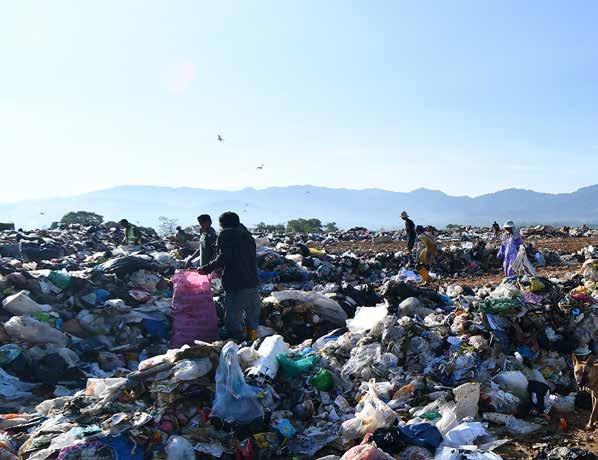
3 minute read
Reimagining the POTENTIAL of waste
by 3S Media
South Africa generates 108 million tonnes of waste per annum – worth R25.2 billion. Some 90% of this is landfilled at overcapacitated sites, with only 10% being recycled. These resources could have been fed back into the economy by means of recycling, repurposing and reusing.
By Kate Stubbs
Advertisement
According to recent reports, it is estimated that around R17 billion of resources is landfilled annually. We have a potential waste crisis on our hands, and one that demands urgent attention. The great news is that there is a real opportunity for South Africa to increase the scope of recycling. There are two big questions: do we have what it takes to manage waste resources effectively and what needs to be done to ensure that we don’t run into a waste crisis?
The zero-waste-to-landfill goal by 2030 is an ambitious one: to divert 90% of waste from landfills using a ‘whole system’ through recycling, reuse, recovery, beneficiation technologies, and towards value-adding opportunities that have the potential to create numerous environmental, social and economic benefits for South Africa. If a zerowaste sustainable country is to be achieved, then waste management can no longer be looked at with a linear view going forward.
The introduction of the circular economy
The circular economy model is a relatively new concept; however, as a reformative system, it offers significant opportunities to deliver on more inclusive economic growth, which includes job opportunities and positive environmental practices that are direly needed for sustainability.
Waste is a universal issue, as it presents much broader challenges that not only affect human health and livelihoods but also the environment and, ultimately, the economy. And so, with over 90% of waste being discarded or burned, especially in low-income countries – where many valuable resources are lost – it becomes crucial for the industry to look at exploring innovative and sustainable solutions, where rapid growth and resilience are at the forefront of its decisions.
Therefore, promoting circular-economy thinking – which aims to challenge the status quo and encourage a mindset change around waste and waste management – is key in encouraging the ‘nothing wasted’ mindset.

The consumer and corporate consciousness
As more consumers begin to adopt the nothing wasted mindset and become concerned about product sustainability, and as many businesses are now pushing the waste industry to innovate and effectively repurpose waste (not merely into something that is useful, but also enables cost-saving opportunities for those organisations), we are seeing a strong drive of this reformative, restorative and regenerative system.
Aiming to strip out all unnecessary waste materials, energy losses and related carbon emissions across supply chains and – through integration and innovation – promote closing gaps to allow materials, energy and resources to be fed back into the cycle should be a critical priority for all waste management stakeholders. The consensus is that a more sustainable eco-cycle will be achieved through long-term design and planning, maintenance, repair, reuse, remanufacturing, refurbishing, recycling, and upcycling.
Government directive
The South African government continues to make commitments to redirect waste from landfills and, in support of this, new laws have been legislated and regulations are being rolled out – all aimed at cleaning up South Africa and reducing the negative environmental as well as health impacts caused by waste. For example, the new EPR (extended producer responsibility) is being implemented, whereby producers are required to take responsibility for their products following the sale thereof.

This ensures that, from production stage, the producer is already implementing strategies to ensure their products can be reused or recycled wherever possible and that input materials used are sourced sustainably and waste is minimised throughout the value chain.
This completely eliminates the ‘throw-away’ culture that is still prominent in the country, and promotes resilience and long-term sustainability for the local waste sector – encouraging global standards and tackling them with a long-term view that will take South Africa into a green and profitable future.
The industry needs to shift the focus completely from landfilling and create facilities that can deal with the valuable waste in a more efficient manner. This innovative thinking is what will lead the waste management sector into promoting circular-economy thinking, building on the philosophy of reuse wherever possible. And where reuse may not be possible, it must adopt a more environmentally friendly approach to recycling and/or appropriate waste disposal.
However, we need to instil a complete culture change and shift markets towards ‘giving back to the system’ in how we approach and treat resources versus waste, so as to avoid potential crises and ensure we build towards a resilient and sustainable future.

